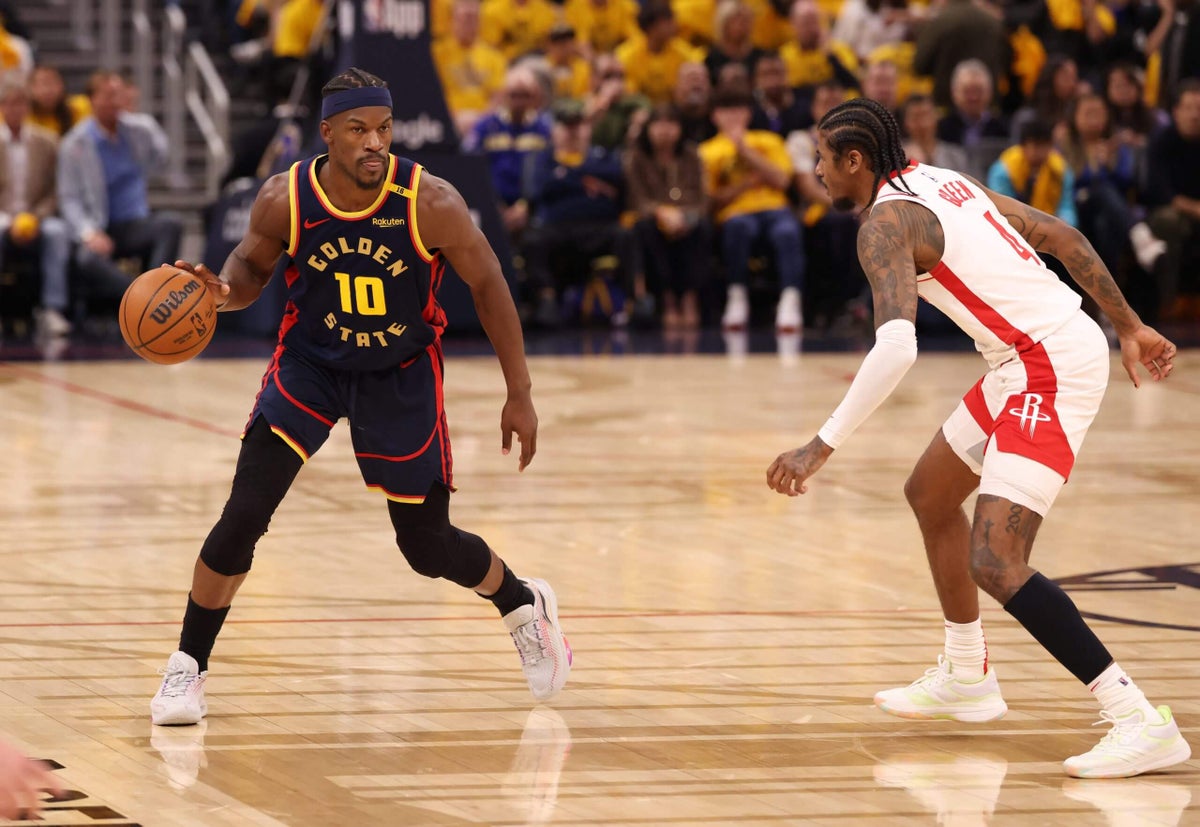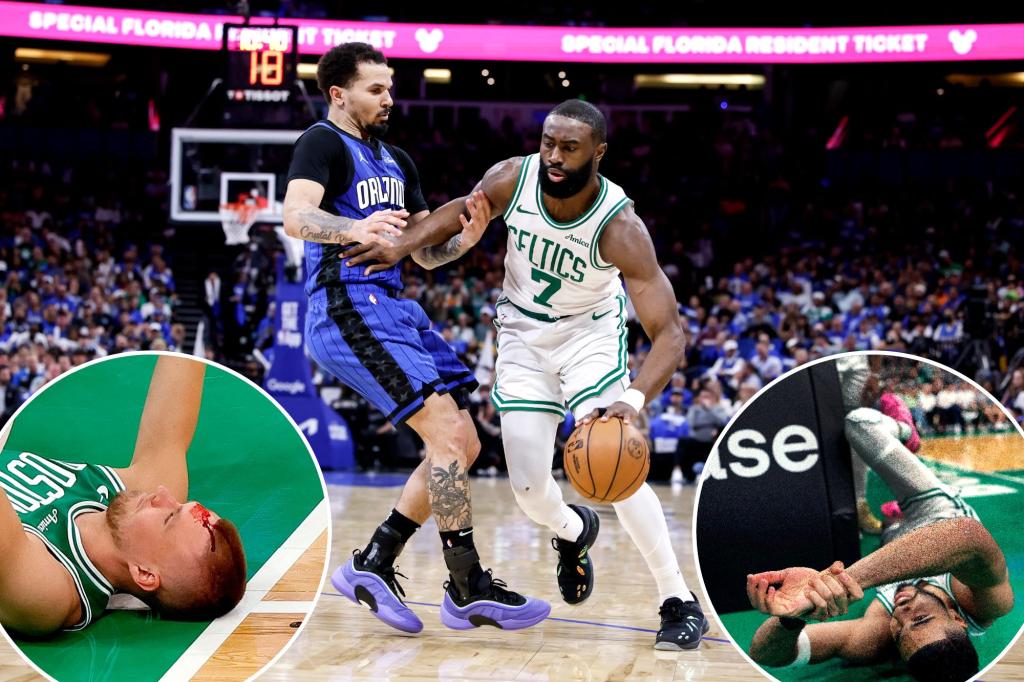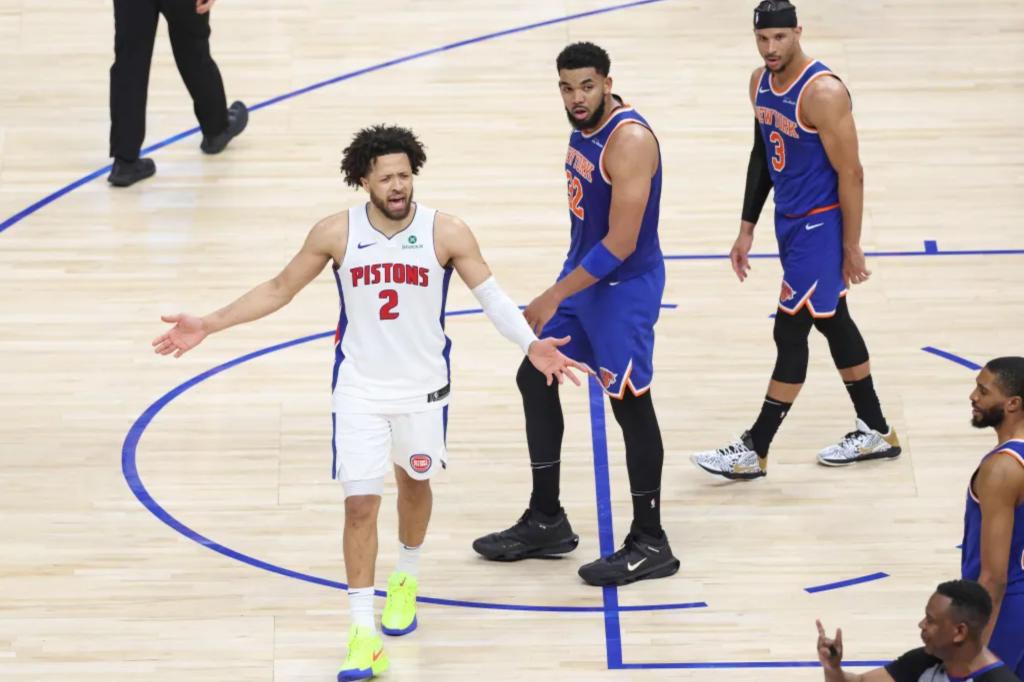
In a tense Monday-night matchup in San Francisco, the Golden State Warriors held off the Houston Rockets 109-106 to take a 3-1 lead in their Western Conference first-round series.
The teams swapped the lead 11 times throughout a physical game that involved multiple skirmishes, technical fouls and also Draymond Green landing on the bench for more than a quarter. Of course, none of that is new for this series.
Advertisement
Monday’s game also saw the return of Jimmy Butler, who exited during the first quarter of Game 2 after a hard fall on his tailbone. Butler had a quiet first half Monday but ultimately scored 27 points, more than half of which coming in the fourth quarter.
The atmosphere in Miami could not have been more different. On Saturday, the Miami Heat experienced their worst-ever loss in the postseason, dropping Game 3 to the Cleveland Cavaliers by 37 points. It only took two days to beat that record. The Heat lost 138-83 to the Cavaliers on Monday.
Cleveland completed the sweep to advance to the Eastern Conference semifinals. The 55-point margin was three points shy of an NBA playoff record shared by two teams. The Minneapolis Lakers beat the St. Louis Hawks 133-75 in 1956, and the Denver Nuggets beat the New Orleans Hornets 121-63 in 2009.
Cleveland took hold of the game from the outset and never let go, leading Miami 72-33 at halftime. The Cavaliers, who once led by 60, shot 54.7 percent from the field, compared to the Heat’s 36 percent.
Miami played Monday’s game without Kevin Love, whose father, former NBA player Stan Love, died this week at 76.
Cleveland will next face the winner of the series between the Indiana Pacers and the Milwaukee Bucks. The Pacers lead the series 3-1 and will try to earn the gentleman’s sweep Tuesday night at home.
Warriors 109, Rockets 106
(Warriors lead series 3-1)
Green, Butler come through in the final minute
Alperen Şengün spent much of the second half barbecuing a Warriors’ defense that didn’t have Green, who was forced to the bench because of five fouls and nearly out of the game because of a technical and flagrant foul combination.
But Green was back in crunch time, which squared him up with Şengün in the game’s deciding sequence. Houston’s young center had 31 points when he attacked Green with less than 10 seconds in isolation. Green, however, stood his ground and forced a spinning, contested, errant hook shot. The ailing Butler came flying in from the baseline corner for the rebound of the night and hit two free throws on the other end, and the Warriors firmed up a commanding 3-1 lead in this first-round series over the Rockets.
Here’s the late Draymond Green stop on Alperen Sengun, the flying Jimmy Butler rebound from the baseline and Green’s ensuing celebration.
Warriors lead the series 3-1 over the Rockets pic.twitter.com/zRdIYAZCLn
— Anthony Slater (@anthonyVslater) April 29, 2025
The deciding whistle in a game loaded with officiating interruptions came with 58 seconds left. Trapped in the left corner, Butler was forced to heave a 3 with the shot clock ticking away. As he rose, Dillon Brooks slid under him and committed a foul that gifted Butler three free throws. He made all three attempts, and the Warriors protected that lead in the closing minute, finished off by Green’s defensive play.
The Warriors now travel to Houston with the first of what will be three cracks at a closeout game over the Rockets. In their last title run, they struggled in this exact spot — Game 5 on the road with the chance to eliminate a desperate opponent. — Anthony Slater, senior writer
Golden State shuts down Jalen Green
Game 4 was marred by a myriad of skirmishes, which detracted from the actual basketball to some degree, but the Warriors’ pressure on Jalen Green — and how the Rockets responded — will ultimately determine how the rest of this series plays out.
Through the first four games of this matchup, Golden State has made it clear that they don’t want Green finding a rhythm under any circumstances. From the opening tip, Buddy Hield pressured Green almost 90 feet from the basket, forcing two early turnovers. When Gary Payton II checked in, he followed the same orders. In the moments where a Warrior wasn’t draped all over him, Green saw traps, doubles and hard blitzes, forcing him to give up the ball and trust his teammates to make plays.
Advertisement
Coach Ime Udoka bemoaned the Rockets’ inability to take advantage of four-on-three situations in the half court and challenged them to course correct. On Monday, they doubled down on their struggles. Green was effectively schemed out of the game, forcing Udoka to sit him earlier than normal, missing the final nine minutes of the third quarter. When Green was brought back in the fourth, Golden State held him without a field goal until being subbed for the final five minutes.
Similarly to Game 3, Fred VanVleet took the reins and forced the issue, and Şengün and Amen Thompson found success attacking the middle, but that wasn’t enough to overcome a feisty Warriors team, multiple scoring runs or another abysmal free-throw shooting night.
We all know the story about 3-1 leads. Now, the Rockets find themselves with their backs against the ropes as they head home for an elimination game, uncharted territory for a No. 2 seed in the first round. — Kelly Iko, staff writer
Cavaliers 138, Heat 83
(Cavaliers win series 4-0)
Cleveland dominates without Darius Garland
At one point, this game was 70-25. So, yeah, what would you really like to know?
Prior to the start of this series, Cavs coach Kenny Atkinson was adamant that Miami would be such a difficult first-round opponent that Cleveland would learn valuable lessons and emerge as a better team. Was the lesson that they’re a better team when Darius Garland is out? (CALM DOWN. That’s a joke and untrue.)
It is true, however, that Garland didn’t play Games 3 or 4 of this series because of left big toe sprain, and the Cavs won those two games by a combined 411 points (also a joke). But the Cavs played brilliantly on offense in the first two games of this series, with Garland scoring 24 points per game, and we have to chalk up quite a bit of what happened to the massive talent and chemistry advantages Cleveland had.
Advertisement
But also, just thinking out loud, if the Pacers (assuming they advance past Milwaukee) successfully hunt Garland on defense next round, and assuming the Boston Celtics do it in the conference finals, the Cavs showed they have the depth and the fortitude to win with Garland playing fewer minutes. In Games 1 and 2, Atkinson played Donovan Mitchell more minutes than Garland, using lineups with Mitchell, Evan Mobley and a combination of reserves more than pairing Garland and Jarrett Allen with those same reserves.
Speaking of Allen … my goodness. He had 12 points, 11 boards and six steals — IN THE FIRST HALF. He also tied the Cavs’ franchise record for steals in a playoff game with those six swipes.
Cleveland led by 39 at halftime for their second-largest halftime lead in a playoff game, and the team was ahead by 48 after three quarters — even though Atkinson started pulling starters midway through the third. Late in the fourth quarter, the Cavs were briefly ahead by 60, which would have been an NBA record for victory margin in a playoff game had it held.
I could continue, but … 70-25, bruh. Let’s move on to the second round. — Joe Vardon, senior writer
Miami’s offense falters
The Heat made an impressive run late in the season to reach the playoffs, but this was a shocking finish. Miami followed up its biggest playoff loss with an even bigger one, dominated by the East’s top seed from the opening tip.
Tyler Herro had four points on 1-for-10 shooting, the worst game of his career, and Miami’s offense looked completely broken. After returning from Cleveland, it appeared as though Miami had figured things out on offense and had a chance to get back in this series. The Cavs’ defense, however, stifled them in Game 3 and then completely erased them from this series in Game 4.
There was no competing with Cleveland’s length on defense, which took away just about every passing outlet the Heat tried to create. It was rare to see Miami even swing the ball around the arc in this series, as there was often confusion about their spacing, and passes were off-target. There was an unusual number of fumbled catches on kick-out passes, taking away the advantage Miami could create with its ball movement. It was hard to believe this was an Erik Spoelstra-led team, considering how poor the execution was.
Advertisement
But the Heat had a major talent deficit in this series and simply did not have the ballhandlers or shooting necessary to hang with the league’s best offense. Bam Adebayo couldn’t get into the handoff actions that have been his specialty over the past few seasons. Herro couldn’t get much room to operate, and the Heat’s spacing around him made it hard to find any open shooters.
Davion Mitchell was the bright spot in this series, showing his ability to run point and get to the paint when nobody else could, but the Cavs were willing to let him attack if it meant keeping Miami off the 3-point line. With Andrew Wiggins clearly limited by lower body injuries, Nikola Jović struggling to shoot returning from a hand injury and rookie center Kel’el Ware simply not ready to compete at this high of a level, Miami just couldn’t come close in the end. — Jared Weiss, staff writer
What’s next for the Heat?
Any energy the Heat used to inspire their late-season postseason push was completely drained by the end of Game 4. Although the Cavaliers rightly entered this series as the favorite, the Heat had a promising-enough showing in Game 2 to believe returning to Miami could help breathe life into their efforts.
That did not happen in this series’ final two matchups, as evidenced by the Heat becoming the first team in NBA history to lose consecutive home playoff games by at least 35 points. The 2017 Celtics are the only other team to do so while losing by at least 30 points.
Scattered boos became commonplace throughout Game 4, largely because the Heat didn’t begin the contest with any competitive energy. A stolen tip-off by and score by Allen set the tone for a morbid end to the season.
The Heat will begin their offseason assessing who to keep and what to do to begin overhauling the roster after Jimmy Butler’s February departure via trade shifted Miami’s direction midseason. Defense often is the catalyst behind anything the Heat do, but upgrades on offense must be a high priority for a team that has finished with a top-10 offense only once in the last 11 seasons (seventh in 2019-20). — James Jackson, staff writer
(Photo: Kelley L. Cox / Imagn Images)


